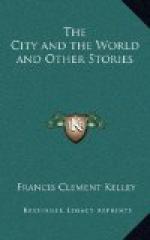“Then he broke down, mon ami, and I fear that I cried just a little too. It was sad, for he was a great strong man.
“When he could, he looked up and continued: ’Well, Father, I am here to do it. I want your help. May I have it?’
“I told him I would do what I could. He wanted me to take the money and give it to the owner. He would tell me his name. I was glad to aid the poor man who was so repentant.
“’All I want is a pick and shovel and a reliable man to go with me to-night. I can find the place,’ he said.
“I offered to send the sexton with him and let him have the pick and shovel from the cemetery. I gave him food and thanked God as I watched him eat, that grace was working in his heart again.
“‘I will wait for the man at seven to-night, Father,’ he said when he was leaving. ’Let him meet me with the horse and buggy just outside of the town. If there is danger I will not see him, and he can return. I will take the pick and shovel now, and bring the stuff to you in a valise by 10 o’clock. Wait up for me.’
“He left and the sexton went to the road at seven, but did not see him. At 10 o’clock I heard him coming. It was very dark and he knocked sharply and quickly, as if afraid. I opened the door and he thrust a valise into my hand. It was heavy.
“’Here it is, Father. Keep it till morning when I will bring the key. The valise is locked. Give me something that I may buy a night’s lodging and I will come back at seven.’
“I gave him the first note in my purse and he hurried away.
“Now I fear, mon ami, that I never quite overcame my childish curiosity, for I felt a burning desire to see all that treasure, especially the strange ring. I must root out that fault before I die or my purgatory will be long. I went to the kitchen where I had a good chisel, and I am sorry to confess that I opened the valise just a very little to see the heap of precious things. There was an old cigar-box and something heavy rolled in cotton. I thrust the chisel down till I opened the box. There was no treasure in it at all, but just a lot of iron-shavings. I felt that I had been fooled and I broke the valise open. The heavy stuff rolled in the cotton was only a lot of old coupling-pins from the railroad. I was disgusted with this sinner, this thief. But it was droll—it was droll—and I could scarcely sleep with laughing at the whole farce. I know that was sinful. I should have cried. But he was clever, that Yankee tramp.”
[Illustration: “Mon Dieu! It was mine.”]
“And the valise? What did you do with it?” asked the hard-hearted Cure of Ste. Agatha, who must have felt sorry that the friend could be so easily duped. “What did you do with the valise?”
“I let it go. I knew that he had left it with me and I couldn’t understand why. It was so good—almost new. I felt that the sight of it would make me hard to the poor who really were deserving. I wanted to forget how foolish I was, so I gave it to the good Sisters at the Hospital, to use when they must travel to Sherbrooke.”




